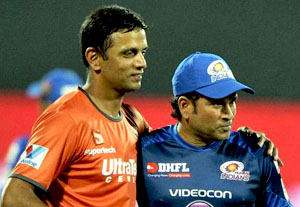 Mumbai, Mar 15: Former skipper Rahul Dravid has said that the batting legend Sachin Tendulkar was the first Indian to dominate the fast bowlers and had set a benchmark for the youngsters to take on the quickies.
Mumbai, Mar 15: Former skipper Rahul Dravid has said that the batting legend Sachin Tendulkar was the first Indian to dominate the fast bowlers and had set a benchmark for the youngsters to take on the quickies.
"I think Sachin was the first great dominating batsman against fast bowling. We had a generation earlier of Sunil Gavaskar, G R Viswanath, whom we grew up idolising, and Sachin did as well. We had some great fast bowlers in 80s and 90s and Gavaskar had a phenomenal record against them. But what Sachin brought was dominance to fast bowling," Dravid said.
"Gavaskar was a slightly more defensive batsman, if I may say that, but Sachin had grown up in a different era and had someone like Viv Richards as his idol, especially when he first batted in the 90s. The way he dominated fast bowling and the way he took on fast bowling was something that was unique and different," Dravid said at the annual ESPNcricinfo awards on Friday.
"A lot of Indian batsmen were not necessarily known to do that. I think he set the benchmark for a lot of young players like Virender Sehwag."
Dravid said Tendulkar's presence in the dressing room not only served as a great inspiration to the upcoming players but drove them to work even harder to earn his respect.
"He was the kind of player whose respect you wanted to earn. I remember 'Sportstar' used to interview players and they would ask who were the cricketers of the future. We were playing the Test series in England and we were in Cambridge and somebody gave me this magazine and it had Tendulkar's interview. I quickly turned to the interview and saw cricketers of the future and he had mentioned Rahul Dravid. I felt so happy," he said.
"It was after the Lord's Test match...he did make me score 95 runs before I earned it," recalled Dravid.
"That is the kind of impact he had on you as a youngster coming into that side. Not only because he was going to be the captain and he was a senior player in the side, but because he was a great player and he
had already done so much that you wanted him to get that nod of approval. And that was a huge inspiration for a lot of cricketers in that generation," the 41-year-old said.
Dravid made his debut in 1996 when Tendulkar was already an established name, and the Karnataka batsman said, "In some ways an inspiration but quite intimidating as well. He was my captain in the third Test match that I played."
Tendulkar bagged the award for cricketer of the generation, pipping the likes of former Aussie spin legend Shane Warne and South African all-rounder Jacques Kallis here last night.
Dravid said facing Warne was a challenge due to the drift he got and it almost blind-sided a batsman.
"One of the differences in playing someone like Shane Warne was the kind of drift that he got. When he was at his best, he had the ability to drift the ball into your pads and then spin it away sharply," Dravid explained.
"That was a unique challenge which I think was quite different from the some of the other traditional leg spinners that I had grown playing up with. The drift almost blindsided you and it forced you to play on the leg side. He had great control, great variation and he had a great cricketing mind as well. When you won a contest against him, it gave you great personal satisfaction," he added.
Dravid, who played with Kallis in IPL franchise Royal Challengers Bangalore, said the South African was shy and an introvert.
"He scored one more Test run than me in international cricket and I think he has taken five or six wickets less than Zaheer Khan. If you look at the impact the player has had for his team in international cricket, it has been phenomenal. To see someone like him be able to bowl those 20 overs and bowl at that speed, and he was pretty quick when he first started.
"I think he realised at some stage that he wouldn't be the best fast bowler South Africa had produced since re-admission into international cricket, but if he kept scoring runs and kept working on his batting,
he would probably become the best South African batsman since. Without a doubt he is their best batsman since re-admission," he said.
"His incredible ability to almost have a deadpan expression irrespective of what was going on, and people tell me Dhoni is able to have a calm demeanour and you can never tell from Dhoni's face what is happening on the cricket field. And that was true of Jacques Kallis as well."





Comments
Add new comment